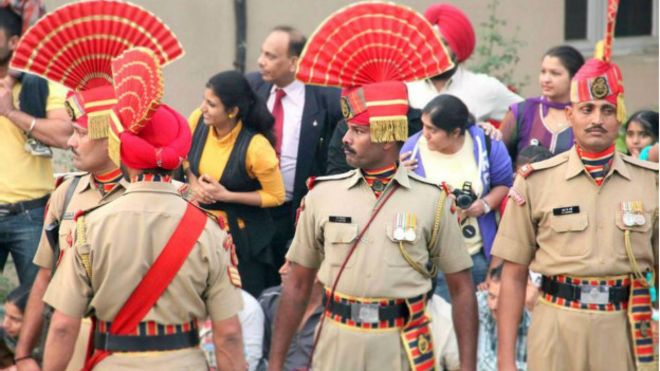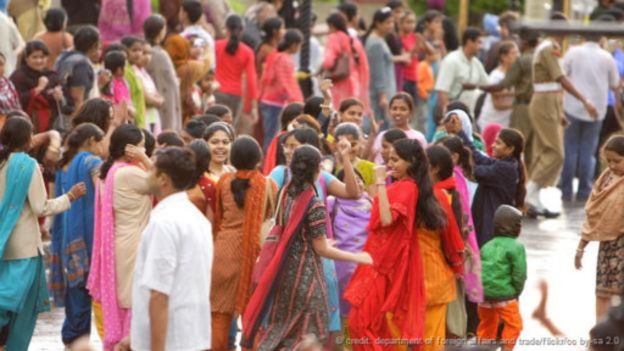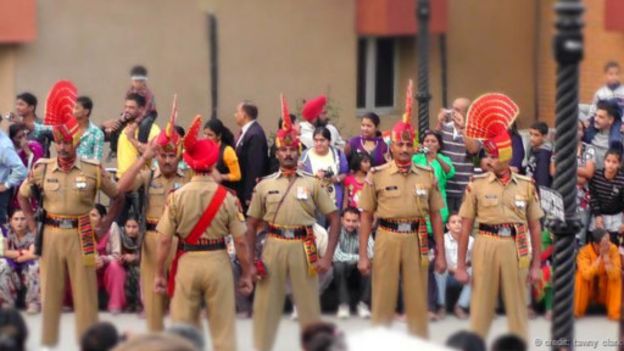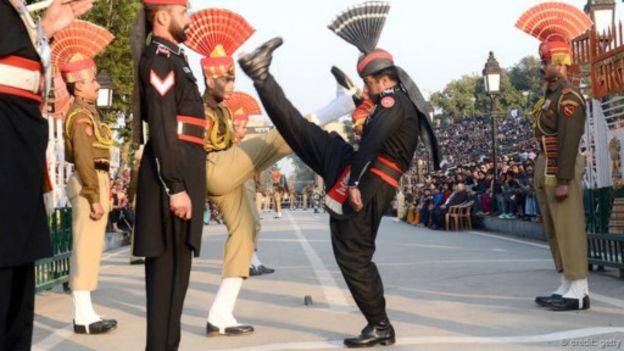印度边境线上的离奇仪式 - BBC中文网托尼·克拉克(Tawny Clark)(2023年6月6日)

表演仪式的守卫 (图片来源: 托尼·克拉克)
当我们乘坐的出租车接近边境时,我明显抑制不住紧张,手心也开始冒汗。我和丈夫曾向家人承诺过,在长达一个月的印度之旅中我们不会冒任何风险。然而我们是这样频繁而不顾一切地选择冒险,以至于当我们发现自己正径直朝印巴边境前进时,已然丝毫不以为意。
印度与巴基斯坦之间的历史充满了纷争。1947年,英国从印度次大陆撤退。撤退前,英国将旁遮普(Punjab)地区一分为二。这是一块介于阿姆利则市(Amritsar)和拉合尔市(Lahore)之间的肥沃之地。多年来,宗教问题上的分歧以及克什米尔地区的分裂不断导致暴力冲突与流血。最近的一次小规模冲突造成了九位平民死亡。
尽管关系紧张,两国依然在每天日落之际共同举行狂热、甚至可笑的降旗仪式以标志边界在夜间关闭。几天前,我们离开烟雾缭绕的阿格拉(Agra)和庄严雄伟的泰姬陵,跳上了发往阿姆利则的火车,憧憬着一览这场高抬腿演出。
从阿姆利则乘车往西30公里,我们来到了印巴瓦格赫(Wagah)边境的雅达利(Atari)镇,这是印巴之间唯一的合法通道。数百位印度国民聚集在这里。小贩穿梭在人群中,兜售盗版的碧昂斯(Beyoncé)光盘,泰姬陵模型和jalebi——这是一种橙黄色的传统印度甜食小吃。

身着鲜艳纱丽服的妇女观看仪式。
在一个看起来很是官方的水泥碉堡外,等待的观众们被隔成两列。一边站着男性,另一边站着女性。在印度这样一个混乱的国家中,队列却出人意料地井然有序。
我向丈夫挥手告别,加入了身着鲜艳的纱丽服,蹲在地上的印度妇女构成的长列中。一位外貌冷峻的边防人员拍了拍我的肩膀,同时示意我的丈夫看向他所指的标有“外国人”的单独队列。在这个队列中,男女游客可以排在一起。在接受护照检查和简单搜身后,我们沿着漫长的通向官方边界的柏油路往下走。在小路尽头,降旗仪式正等着我们。
这条长约100米的、仅有的柏油路从我们所在的印度边界开始,穿过两个高耸的开敞铁门,并最终延伸至巴基斯坦。街道两侧都有大看台和人行道。座位似乎按等级安排。特邀的印度来客以及贵宾被安排在了最靠近边境大门的看台上,其次是专门预留给外国人的水泥看台。印度男子,妇女和儿童坐在人行道边上和我们身后的大看台上。
从我们这看去,在越过边境大门不超过50米远的地方,巴基斯坦的大看台清晰可见。巴方的坐席按性别隔开。巴方在场的诸多妇女中,有些迎着音乐,打着节拍,有些挥舞着白绿色的巴基斯坦国旗,还有一些彼此间兴奋地交谈着。视线往左边扫过,可以看到巴基斯坦男性观众肃穆的面庞,没有人的脸上流露出兴奋之情。

表演仪式的守卫 (图片来源: 托尼·克拉克)
而在印度这边,司仪身着白色运动服,领着我们高喊"Hindustan Zindabad!” (印度万岁!),同时我们可以听到从大门的另一侧传来的呼喊着“巴基斯坦!”的声音。伴随着朗朗上口的电影《贫民窟的百万富翁》歌曲“Jai Ho”,人们应和着节奏,拍手、跳舞,活跃万分。这一刻,人们似乎忘了,在脚下的边界线两端,是关系充斥着对峙与冲突的两个国家。
伴随着一声呼喊,仪式开始了。参与仪式的印度边防军身着官方的卡其布制服,佩戴着勋章,戴着高耸的,如鹦鹉羽毛般的红色扇形帽子。
一位面若磐石的守卫走向麦克风,深吸一口气,然后发出气势恢宏的吼声。而另一侧也在同时传来回应的吼声。他与担任同角色的巴基斯坦守卫试比高低。两个来自不同国家的男子,相隔不逾百米,进行着一场激烈而古老的吼叫角逐。
我们的守卫结束吼叫战斗后(巴基斯坦守卫以几秒的微弱优势战胜了他),便向着巴基斯坦的方向快速沿路行进,其后跟随着五个虎背熊腰的同伴。他们气势轩昂地走到马路中间,开始一系列整齐的高踢腿与跺脚,他们奇迹般地保持炫耀着极尽夸张的羽毛头饰与严峻的表情。印方守卫们时不时气势汹汹地瞪视巴方守卫们一眼,仿佛要恐吓他们的对手。

表演仪式的守卫(图片来源: Getty)
此时此刻,人们的爱国之情溢于言表;所有人都呐喊着,欢呼着,鼓掌着,人们随着沿路前行的守卫从面前经过时分批跟着吼叫。在边境大门完成了一系列跺脚与高踢腿动作后,守卫们结束了吼叫比赛。与此同时,他们的巴基斯坦对手也同时完成了自己的武术表演般的舞蹈动作。双方同时完成这些动作后,他们凝视着对方,整个仪式陷入一片死寂。
充满男子气概的展示持续了二十分钟,守卫们被分为六组彼此竞争。每个人都有展示自我的机会。我也陶醉在狂欢中,和着音乐鼓掌,在守卫完成了超高高踢腿动作时欢呼雀跃。昂扬的表演者们继续着他们的路途,沿途接受着热情的群众的欢呼。
两国的国旗几乎在同一时刻一齐降下,整个仪式却显得“虎头蛇尾”。两国的领头守卫握手以示善意,然而握手的持续时间却是真正意义上的“转瞬即逝”。在最后的号角声中,边境大门关闭,仪式圆满结束。
当人们开始散去,我和丈夫依然坐在原地,回味着我们刚才所见的一切。印度和巴基斯坦也许有着漫长的冲突历史。然而每天晚上的短暂片刻,两国都会步调一致地关闭他们的边境大门。虽然只是片刻和平,却足以温暖人心。
India’s beautiful border ritual - By Tawny Clark
My palms began to sweat as our taxi approached the border; my nerves were clearly getting the best of me. My husband and I had promised our families we wouldn’t do anything risky on our month-long journey through India. But seeing as how we often chose adventure over just about anything else, it was little surprise that we’d found ourselves driving straight for the India-Pakistan border.
India and Pakistan share a history riddled with conflict. Before Britain withdrew from the Indian subcontinent in 1947, it split the fertile Punjab region down the centre, between the cities of Amritsar and Lahore. Over the years, disputes over religion and the divided Kashmir region have led to violence and bloodshed, with one of the most recent skirmishes leaving nine civilians dead.
Despite this tense relationship, both countries come together every sundown to produce a zealous, passionate ceremony that marks the nightly closing of the border. Leaving the smog of Agra and the majesty of the Taj Mahal a few days early, we’d hopped a train bound for Amritsar, eager to witness this high-stepping performance for ourselves.
From Amritsar, a 30km drive west brought us to the town of Atari, on the Wagah border, the only legal crossing between India and Pakistan. Hundreds of Indian nationals were already gathered. Hawkers were penetrating the crowd, touting pirated Beyoncé CDs, Taj Mahal models and jalebi, a traditional neon-orange Indian treat dripping in sugary syrup.
Just outside an official-looking cement bunker, waiting spectators were sectioned off into two lines; one for men and one for women. In a country as chaotic as India, the lines were unexpectedly orderly.
I waved goodbye to my husband and joined a long row of crouched women resplendent in brightly coloured saris. A stern-looking border guard tapped me on the shoulder, motioned to my husband and pointed to a separate line marked “foreigners", where visitors of both sexes were allowed to mingle. After an inspection of our passports and a brief frisking, we were ushered down a long paved path that led to the official border, where the ceremony would take place.
A single paved road roughly 100m long stretched from our side of the border in India, through two towering open iron gates, and over to Pakistan. Grandstands and sidewalks lined both sides of the street and there appeared to be a hierarchy to the seating assignments. Special Indian guests and VIPs were placed in the stands closest to the border gate, followed by the cement bleachers exclusively set aside for foreigners. Indian men, women and children sat along the sidewalks and in the large grandstands behind us.
From our section, just beyond the border gate and less than 50m away, Pakistan’s grandstands were clearly visible. Seating on the Pakistani side was separated by sex, with many of the women clapping to music, waving green-and-white Pakistani flags and excitedly chatting with one another. A quick pan to the left revealed the stoic faces of the male Pakistani spectators, none looking overly thrilled to be there.
Clad in a white tracksuit, our MC for the evening encouraged shouts of "Hindustan Zindabad!” (long live India!) from our side of the border, while echoes of "Pakistan!" could be heard coming back from across the gate. Clapping, dancing and general frivolity were set against the catchy tempo of “Jai Ho”, from the movie Slumdog Millionaire. It was hard to remember that we were literally toeing the line between two countries that have a tumultuous and violent relationship.
The ceremony began with a bang. Or, rather, a yell. The participating Indian border guards appeared in their official khaki uniforms, draped in prestigious medals and donning sky-high red-fanned hats that resembled the plumage of a macaw.
A stone-faced guard stepped up to the microphone, inhaled deeply and then let out a long bellowing yell that was echoed from the other side. He was in direct competition with his Pakistani counterpart. Two men from two different countries, less than 100m apart, were participating in a good old-fashioned scream-off.
Once our guard was finished with his battle call (the Pakistani guard outlasted him by mere seconds), he briskly marched down the lane towards Pakistan with five of his barrel-chested companions following suit. They strutted to the centre of the road and began a series of synchronised stomps and kicks, their extravagantly plumed headgear and severe expressions miraculously never wavering. Every now and then, a guard would send a menacing glare towards the Pakistan border as if to intimidate his rivals.
At this point, the patriotism in the crowd was palpable; each section was roaring with cheers and applause. The border guard that had led the battle call took off down the road, completing a series of stomps and high kicks at the gate – at one point almost kneeing himself in the nose. His Pakistani counterpart was completing his own staccato dance of martial arts manoeuvres. They ended at the same time, concluding with a long-held death stare aimed towards the other.
This machismo display continued for another 20 minutes, with each of the six competing guards having his time to shine. I found myself relishing in the revelry, clapping to the music and gasping when a guard accomplished a particularly high kick. The intense performers continued their routines with all the pizazz one would expect from Michael Jackson wannabes, cheered on by the enthusiastic crowd.
The show came to an almost anticlimactic end when each nation’s flag was lowered at precisely the same time. If I had blinked, I would have missed the brief handshake (a display of good faith) exchanged between the two head guards. And with the final fanfare, the gates were satisfyingly slammed shut.
As the crowd began to disperse, my husband and I remained seated, absorbing what we had just witnessed. India and Pakistan may have a long history of conflict. But it’s also heart-warming to know that every night, just for a brief moment, both countries are unified through the closing of their border gates.